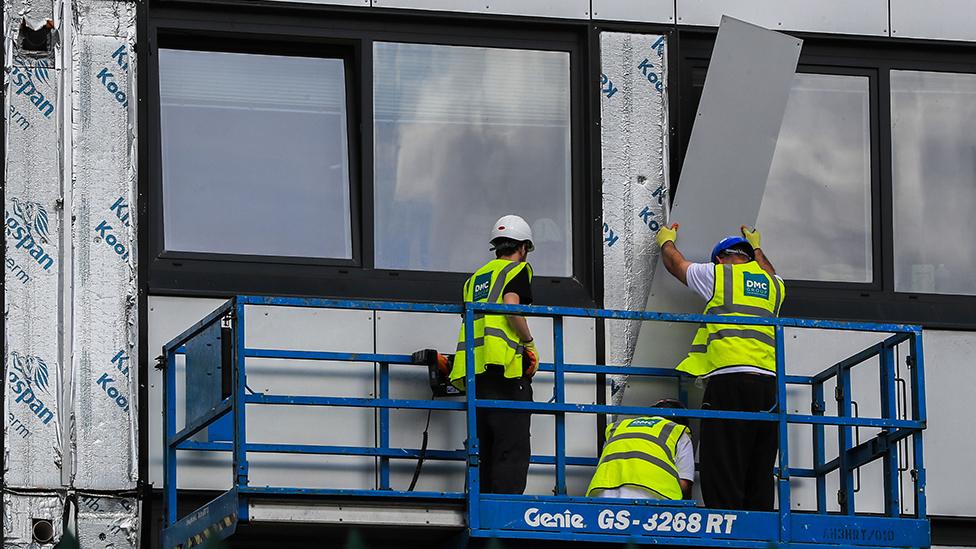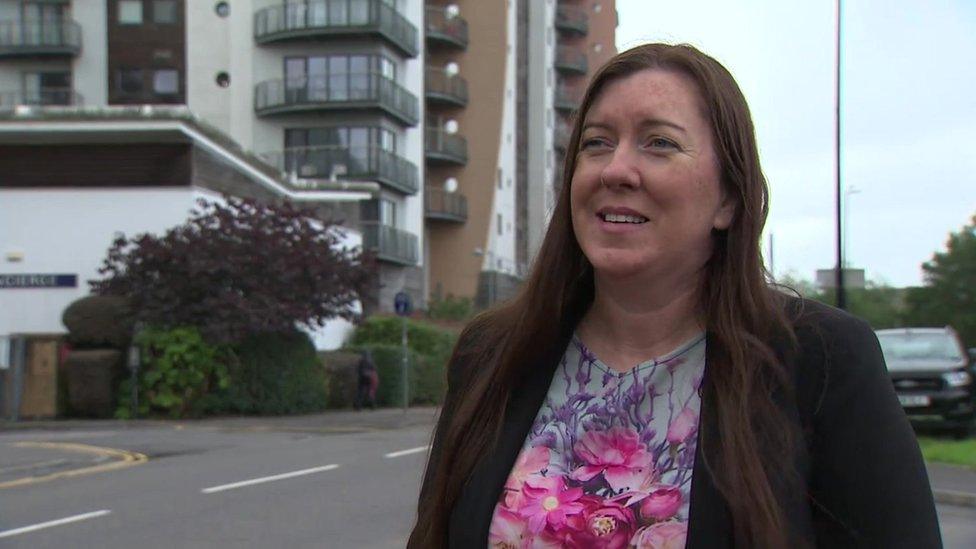Building fire safety work could take three years, says minister
- Published

High rise buildings in Wales with fire safety issues are "guaranteed" to be fixed, but it might take up to three years, a minister has said.
The Welsh government says Wales is the first part of the UK with a plan for all fire safety issues in buildings more than 11m high, not just cladding.
There will also be tighter rules on building inspectors.
Campaigners say they welcome the update, but are worried about a lack of timescales and dates.
People living in high rise blocks across Wales have been struggling to have faults put right since the Grenfell disaster in London in 2017 in which 72 people died.
Many homeowners have been left unable to sell their flats, and are also paying higher insurance and service charge fees.
Asked whether the Welsh government was now guaranteeing that cladding would be replaced, Climate Change Minister Julie James, who is responsible for housing, replied: "Yes, absolutely.
"Here in Wales we do more than cladding. I think we're alone in the UK in saying that we will remediate all fire issues."
On timescales, she said it was hard to be precise because of supply chains, but that it could take up to three years to have an agreed schedule and funding in place.
"It's about experts, people to do the work and so on," she said.
"But somewhere in between the next few months and about three years, depending on the complexity of the works in the building, where you are, what the supply chain looks like and how we can get hold of the contractors who can actually do the work."
The campaign group Welsh Cladiators, which represents residents living in affected blocks, responded: "We see a lack of hard timescales and dates in the minister's statement, which suggests further drift and delay in any real progress
"Sadly, our on the ground daily experience in Wales does not recognise the minister's rather buoyant and bullish statement."
The group said it welcomed any update but "whilst some real and tangible progress has rightly been made in the remediation of social housing developments, thousands of private leaseholders continue to face severe challenges with their fire and build defective homes".
"Many are hugely frustrated by the slow rate of progress."
Tighter rules
In March the Welsh government announced that major developers had signed a legal agreement to fix unsafe blocks.
There are arrangements in place to cover "orphan" buildings where the developer is unknown or the building more than 30 years old, and with smaller developers.
There is also a Leaseholder Support Scheme, which can involve the Welsh government taking over the leasehold of an affected property.
Welsh ministers are bringing in tighter rules for building inspectors, with the oversight of new high risk building being restricted to local authority inspectors from next April.
There will be new standards and registration for building inspectors. The change was welcomed by campaigners.
The latest update forms part of the Welsh Labour government's co-operation agreement with Plaid Cymru in the Senedd.
But Welsh Liberal Democrat leader Jane Dodds asked ministers to create a "transparent and accountable system, like the one already in existence across the border, that allows residents to track building repairs and their progress".
"One of the many people who have been in touch with me on this issue has told me how they have faced delays stretching back four years, during which time they have been footing a very costly bill whilst awaiting repairs.
"The ongoing lack of clear information has left many residents ill-informed and burdened with unnecessary hardship, put frankly they have been left in the dark by Welsh Labour."
- Published1 August 2023

- Published21 March 2023

- Published1 March 2023
